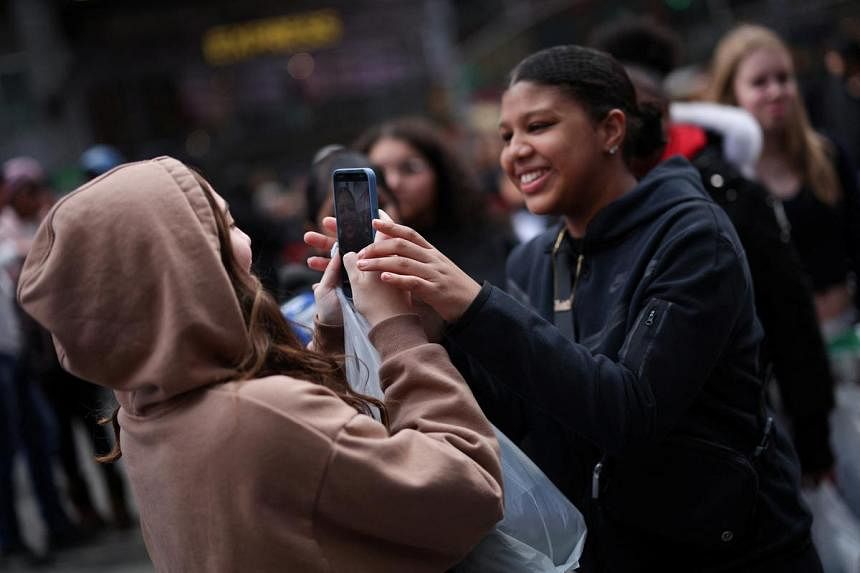WASHINGTON – Ban or no ban, TikTok’s partners in the music and advertising world plan to stick with the massively popular short-form video platform until the bitter end, seven industry leaders told Reuters.
The US Senate passed a Bill late on April 23 that gives Chinese technology company ByteDance up to a year to divest TikTok, or the app will be banned altogether. President Joe Biden has signalled he would sign the Bill, capping a four-year battle over concerns the Chinese government could influence content or access user data.
TikTok has rivalled larger companies such as Meta Platforms for user attention and advertising budgets, and its cultural power is reflected in its ability to catapult emerging artistes into viral hits, changing how young people discover music.
As long as TikTok’s users remain engaged with the app, “advertisers will ride it all the way until the door slams shut”, said Mr Craig Atkinson, chief executive of digital marketing agency Code3.
Mr Adamm Miguest, chief executive and founder of Rapid Launch Media, which creates marketing campaigns designed to make songs go viral, said he will advise clients to stay on TikTok as long as they can.
Even Universal Music, whose artistes’ songs disappeared from TikTok in March as licensing talks stalled, has resumed negotiations in recent weeks, according to two people close to the discussions. The talks reflect the realisation that, whatever the outcome of the legislative process, TikTok is not going away tomorrow, one of the sources said. Universal declined to comment.
The app’s importance is also underscored by how superstar Taylor Swift, a Universal artiste, defied her label by putting her music back on TikTok just weeks later.
“I think we have to look and ask, why did Taylor Swift do that? Even she recognises the power that TikTok yields,” said Mr Johnny Cloherty, chief executive of Songfluencer, a creative marketing firm that has worked with artistes like Dolly Parton and Miranda Lambert.
Musicians aim to get songs circulating on TikTok or other platforms such as Instagram Reels and then have users listen to the music on streaming services. TikTok posts are far more likely to lead to streams, said Mr Miguest, who has worked with musicians such as Muni Long and Sueco.
“From what I’ve seen, you have to get 10 to 20 times the amount of posts on Reels for it to even come close to translating to what you might get on TikTok,” he said.
TikTok also beats Google’s YouTube as the most common music discovery source for teens in the US, said Ms Tatiana Cirisano, a senior music industry analyst for Midia Research.
TikTok has long said it has not and never would share US user data with the Chinese government. It is expected to challenge the Bill.
“This is the beginning, not the end of this long process,” TikTok told staff on April 20, Reuters previously reported.
“This unconstitutional law is a TikTok ban, and we will challenge it in court,” a spokesperson said on April 24. “We believe the facts and the law are clearly on our side, and we will ultimately prevail.”
The company did not respond to a request for further comment.
Rivals on the hunt
Other tech platforms are waiting in the wings for TikTok’s users and ad revenue.
YouTube has been particularly aggressive in going after TikTok marketing budgets, asking ad agencies to test one of its advertising products to see how it performs against TikTok specifically, according to one advertising agency director, who declined to be named discussing conversations with the platforms.
Recent surveys have shown that Gen Z is increasingly using TikTok rather than Google to search for information and businesses. Google did not respond to a request for comment.
Spotify chief executive Daniel Ek told investors on April 23 that short-form video content is “a big focus of ours” that would make its way to the service’s music streaming product in 2024.
Even with their commitment to the platform, advertisers are beginning to shift from their theoretical contingency plans, which have long been in place, to actively testing plan Bs, Mr Atkinson said.
“If we imagine a continuum of ‘maybe this will happen someday’, to the idea that TikTok will be turned off, we’ve moved one step over,” he said.
Both advertisers and music artistes have taken steps to test and diversify their strategies across other platforms, including Instagram Reels and YouTube Shorts. “But none of them have quite garnered the attention that TikTok did,” said Mr Gabriel Lister, managing partner of record label Independent Co.
“The question is whether any of those platforms could replace TikTok’s cultural heft – I don’t believe it would simply be a case of TikTok users migrating over to the competitors,” said Ms Cirisano.
Amid the uncertainty, TikTok will host a glitzy evening presentation for advertisers in New York City next week as part of an annual event organised by the Interactive Advertising Bureau (IAB), a trade group.
There were no changes to the plans as at April 23, the IAB said. REUTERS

